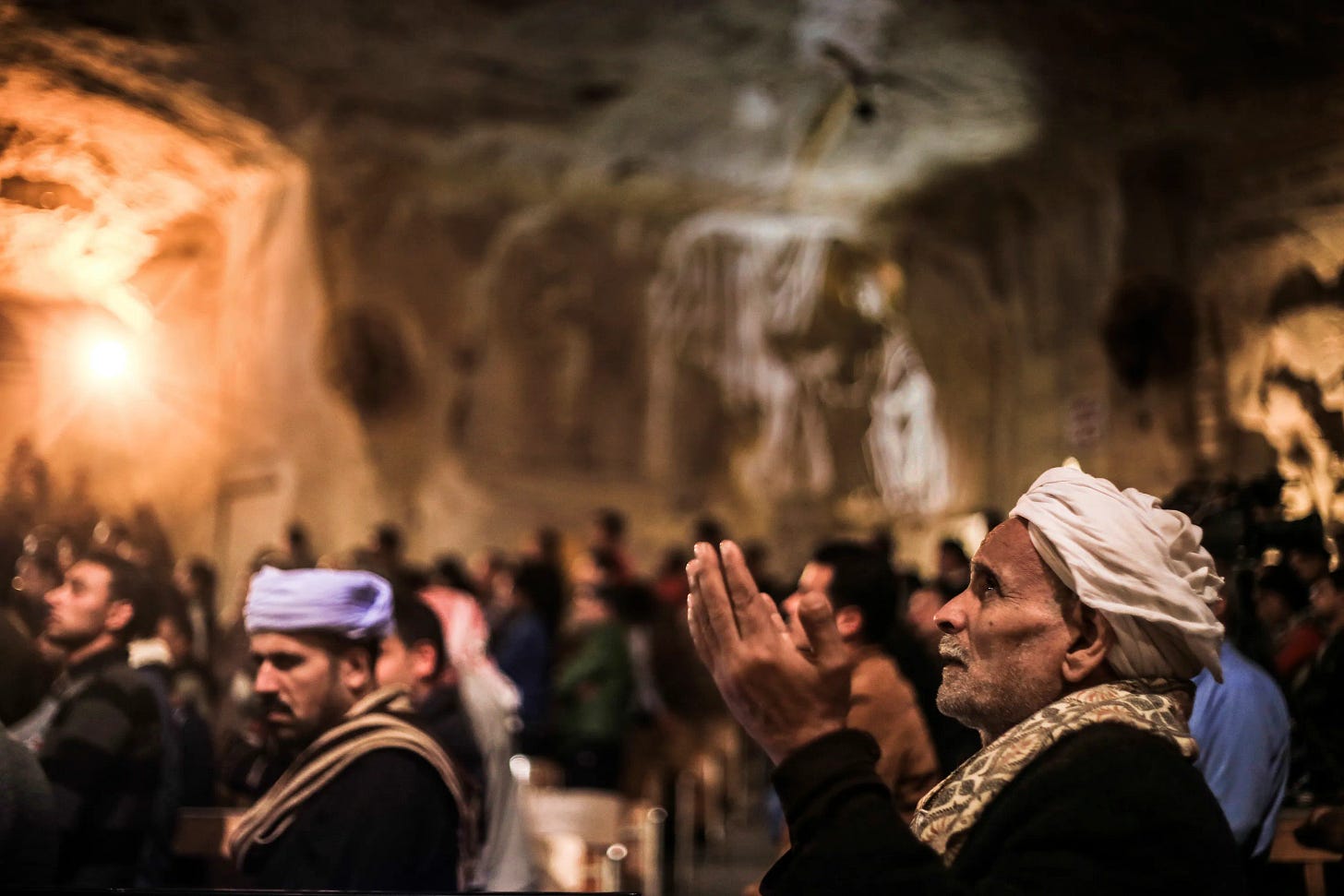Israel as a Model for Minority Survival in the Islamic World
The Imperative of Christian Self-Determination
Since the Islamic conquests of the Middle East in the 7th century, the region’s diverse religious and ethnic minorities, Christians, Jews and others, have navigated a precarious existence under Islamic rule. The dhimmi system, which offered non-Muslims limited protections in exchange for taxes and social subordination, entrenched a hierarchy that relegated minorities to perpetual inferiority. While this framework allowed for periods of relative tolerance, it also sowed the seeds of systemic discrimination, leaving minorities vulnerable to the shifting tides of political and religious fervor.
Among these minorities, the Jewish people faced a particularly harrowing journey, marked by centuries of persecution in both the Islamic world and Christian Europe. Yet, in 1948, the establishment of Israel transformed their narrative, creating a sovereign state where Jews could govern themselves, free from the yoke of external oppression. This achievement stands in stark contrast to the fate of Christian communities, who, despite their deep historical roots in the region, have faced a relentless decline under Islamic dominance. From the Copts of Egypt to the Assyrians of Iraq, Christians have endured systemic persecution, forced conversions, and displacement, often with the complicity of state authorities.
The Historical Decline of Minorities
To understand the imperative of Christian self-determination, one must first grapple with the historical trajectory of minorities in the Islamic world. The Islamic conquests of the 7th century reshaped the Middle East, transforming Christian and Jewish majorities into minorities under Islamic rule. The dhimmi system, while ostensibly protective, imposed heavy taxes, restricted religious expression, and prohibited non-Muslims from holding positions of authority. Over time, this system eroded the social, cultural, and political vitality of minority communities, setting the stage for their long-term decline.
For Jewish communities, life under Islamic rule was a complex interplay of tolerance and tribulation. In medieval Spain, the Granada massacre of 1066 saw Muslim mobs slaughter thousands of Jews, a grim reminder of their vulnerability. In Yemen, the Mawza Exile of 1679–1680 forced Jews into desolate regions, decimating their communities and livelihoods. Even in periods of relative prosperity, such as the cultural flourishing of Al-Andalus, Jews remained at the mercy of rulers whose benevolence could turn to brutality with a change in political winds. The Almohad dynasty’s forced conversions in the 12th century and the periodic expulsions from North African cities underscored the precariousness of Jewish existence.
This pattern of persecution was not unique to the Islamic world. In Christian Europe, Jews faced similar horrors, from the massacres of the First Crusade to the Spanish Inquisition’s relentless pursuit of “crypto-Jews” who had converted under duress. By the 19th century, the Enlightenment’s promise of equality proved illusory, as the Dreyfus Affair in France and the pogroms in Russia exposed the depth of antisemitism even in “civilized” societies. These experiences convinced Jewish leaders like Theodor Herzl that assimilation was a futile endeavor. Only a sovereign state could guarantee the safety and dignity of the Jewish people.
The Christian Decline
Christian communities, once the bedrock of the Middle East’s cultural and religious landscape, have followed a similarly tragic path. In Egypt, the Copts, who predated Islam by centuries, comprised a significant portion of the population before the Arab conquest. Today, they constitute less than 10% of Egypt’s population, their numbers diminished by centuries of discriminatory taxes, social exclusion, and periodic violence. The 2013 attacks on Coptic churches, following the ousting of Muslim Brotherhood leader Mohamed Morsi, saw dozens of churches burned and Christians killed, with little intervention from state authorities. These incidents reflect a broader pattern of state complicity or indifference, as Coptic girls are kidnapped and forcibly married to Muslims, and Christian communities face relentless pressure to conform or emigrate.
In Iraq, the Assyrian and Chaldean Christian populations have plummeted from 1.5 million in 2003 to fewer than 200,000 today, driven by sectarian violence and targeted persecution following the Iraqi war. The Islamic State’s 2014 campaign in Mosul, marked by the infamous “Nun” symbol painted on Christian homes, forced thousands to flee, leaving behind centuries-old communities. In Syria, the civil war has reduced the Christian population from 1.5 million in 2011 to under 500,000, as extremist groups like ISIS and Jabhat al-Nusra have systematically targeted Christians for execution, enslavement, or displacement.
Lebanon, once a Christian-majority nation, offers a poignant case study in demographic and political decline. The Lebanese Civil War (1975–1990), coupled with Syrian occupation and the rise of Hezbollah, has eroded Christian influence, driving many to emigrate. Today, Christians make up less than a third of Lebanon’s population, their political power curtailed by a confessional system that favors Muslim factions. Even in Jordan, often lauded for its tolerance, Christians face restrictions on religious expression, such as bans on public Christian symbols and prohibitions on converting Muslims. These examples illustrate a sobering truth: Christian communities, despite their historical rootedness, are dwindling under the weight of Islamic dominance.
The Failure of Assimilation
Like Jews in Europe, Christians in the Islamic world have pursued assimilation as a survival strategy, hoping to secure acceptance by adopting the cultural and religious norms of the majority. In Jordan, Christians often give their children Arabic names, participate in Islamic holidays like Ramadan, and avoid public displays of faith to deflect scrutiny. In Egypt, Coptic leaders have issued statements aligning with state narratives, condemning Israel or the West to avoid accusations of disloyalty. In Syria, churches have replaced references to “Israel” in Bible readings with euphemisms like “the ancient people” to appease authorities. These concessions, however, have not stemmed the tide of persecution but have instead eroded Christian identity and agency.
A chilling example of assimilation’s failure occurred in Jordan in 2016, when a Christian journalist was assassinated for publishing a cartoon deemed offensive to Muslims, despite targeting ISIS. Rather than defending his freedom of expression, church leaders condemned him as a heretic, mimicking Islamic responses to dissent. This incident underscores the futility of appeasement: even when Christians align with the majority’s values, they remain vulnerable to accusations of betrayal. Similarly, in the West Bank, churches have been burned by Islamic groups, and Christians in Bethlehem, once a Christian-majority city, now number fewer than 10,000, silenced and driven to emigrate.
These efforts to blend into Islamic society mirror the historical attempts of Jews to integrate into European culture. In the 18th century, Moses Mendelssohn advocated for Jews to adopt European languages and customs while maintaining their faith, believing this would lead to acceptance. Yet, the Dreyfus Affair and the Holocaust shattered this illusion, proving that assimilation could not shield Jews from hatred. For Christians in the Islamic world, the lesson is clear: no amount of cultural mimicry can guarantee safety in a region where their identity is inherently at odds with the dominant ideology.
The Power of Self-Determination
The establishment of Israel in 1948 marked a seismic shift in the Jewish narrative, transforming a persecuted minority into a sovereign nation capable of defending itself. Theodor Herzl, the architect of modern Zionism, was driven not by religious nostalgia but by an existential imperative. The Dreyfus Affair, which exposed the fragility of Jewish acceptance in “enlightened” France, and the pogroms in Russia, which killed thousands, convinced Herzl that assimilation was a dead end. His vision for a Jewish state was rooted in the recognition that only self-governance could ensure the survival of a people long targeted for their identity.
Israel’s rejection of Islamic sovereignty was a radical act of defiance in a region where minorities were expected to submit. By creating a state where Jews could govern themselves, Israel established institutions that reflected their cultural, religious, and political values. Despite facing relentless hostility, wars in 1948, 1967, and 1973, and ongoing conflicts with neighboring states and non-state actors, Israel has thrived, building a robust economy, a formidable military, and a vibrant democracy. This success stands in stark contrast to the precarious existence of Christian minorities, who remain dependent on the goodwill of Islamic majorities or authoritarian regimes.
Israel’s achievement is not merely a religious or cultural victory but a testament to the power of self-determination. The state’s establishment in the shadow of the Holocaust, which claimed six million Jewish lives, underscores its existential necessity. For Jews, Israel is not just a homeland but a fortress, a place where they can live as equals rather than as tolerated guests. This model of sovereignty offers a profound lesson for Christians in the Islamic world, who face a similar existential threat.
The Case for Christian Self-Determination
The relentless decline of Christian communities in the Middle East demands a bold reimagining of their future. Living as second-class citizens under Islamic rule has proven unsustainable, as evidenced by the empty churches of Iraq, the burned sanctuaries of Egypt, the dead Christians in exploded churches in Syria, and the inability of the Christians in Lebanon to build a state. The temporary protections offered by authoritarian regimes, as in Jordan or Egypt, are fragile, collapsing in times of chaos or political upheaval. The rise of extremist groups, from the Muslim Brotherhood to ISIS, has only intensified the peril, leaving Christians with a stark choice: emigrate, assimilate, or fight for autonomy.
Israel’s example points to the third path: self-determination. A sovereign Christian state, modeled on Israel’s rejection of subjugation, would enable Christians to govern themselves, protect their cultural heritage, and ensure their security without the need to appease Muslim majorities. Lebanon, with its historical Christian majority and distinct regional identity, offers a viable starting point. The growing calls for federalism or partition in Lebanon reflect a recognition among Christians that autonomy is essential for survival. Mount Lebanon, with its Christian-majority population and historical significance, could serve as the territorial foundation for such a state.
This vision of Christian sovereignty need not be rooted in religious ideology, just as Israel’s establishment was driven by existential necessity rather than solely religious narrative. A Christian state would prioritize practical goals: safeguarding human rights, preserving cultural identity, and providing a safe haven for a beleaguered minority. By establishing institutions that reflect their values, Christians could break free from the cycle of oppression and build a future where they are not merely tolerated but empowered.
Feasibility and Geopolitics
Critics may argue that Christian statehood is impractical, citing demographic fragmentation, geographic constraints, and the lack of a unified national identity. Unlike Jews, whose connection to the Land of Israel provided a clear territorial focus, Christians are dispersed across multiple countries and lack a single “holy land.” However, Lebanon’s Christian-majority regions offer a feasible territorial base, and the shared experience of persecution could forge a collective identity, much as the Holocaust galvanized Jewish nationalism. Moreover, the success of microstates like Qatar and Singapore demonstrates that size is not a barrier to sovereignty.
Another objection is that a Christian state would lack international support, given the geopolitical complexities of the Middle East. Israel’s experience, however, shows that determined minority groups can secure allies through strategic diplomacy. Israel’s alliances with the United States and, more recently, Gulf states like the UAE underscore the potential for a Christian state to navigate the region’s power dynamics. While initial resistance from Islamic countries is likely, the growing recognition of minority rights on the global stage could bolster support for Christian self-determination.
Finally, some may argue that reforms within Islamic countries could protect Christians without the need for statehood. Yet, the historical record offers little hope for this approach. The protections afforded by regimes like Jordan’s monarchy or Egypt’s military are contingent on political stability, which is far from guaranteed. The rise of extremist movements, coupled with the failure of Arab states to uphold minority rights, suggests that reliance on external goodwill is a recipe for disaster. Israel’s success demonstrates that only sovereignty can provide lasting security.









This a really interesting piece. I have been thinking a lot recently about the decline of Christian faith in the West - whilst this isn't the focus of your piece, I think it's relevant, because a decline in Christian faith seems in part to have contributed to the rise of Islam, not only in the Middle East, but elsewhere. If Christianity is tolerated at best, and scorned at worst by the West, that hope do persecuted Christians in the Middle East (not to mention, Africa) have?
And as an aside, it never fails to amaze me when people say that the biggest threat (religion wise) to the US and the West is Christianity!
Interesting article with interesting core idea . This should be pursued - with international help , turning the southern half of Lebanon into a separate Christian state would be historically justified .